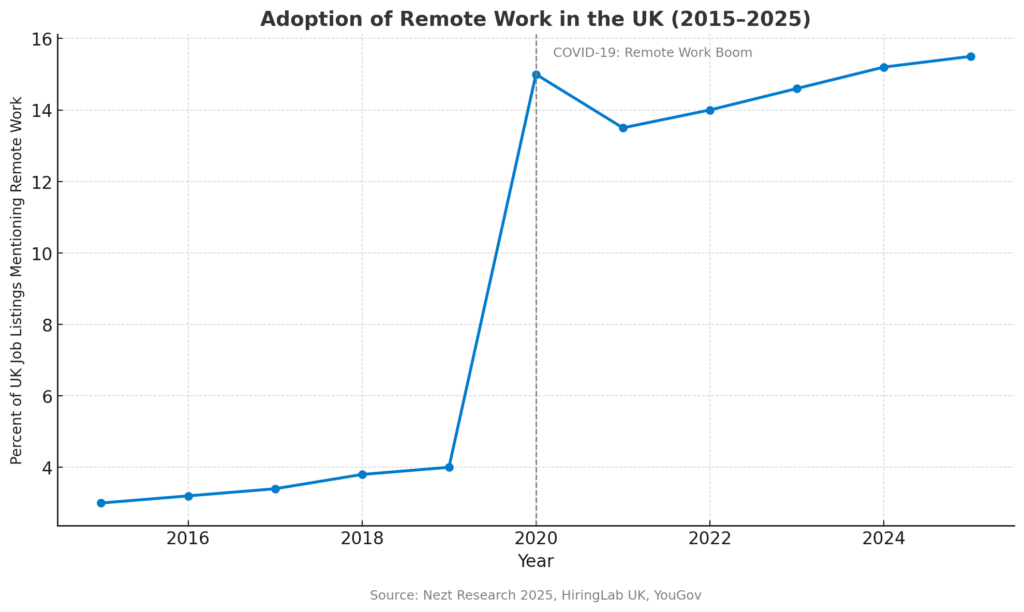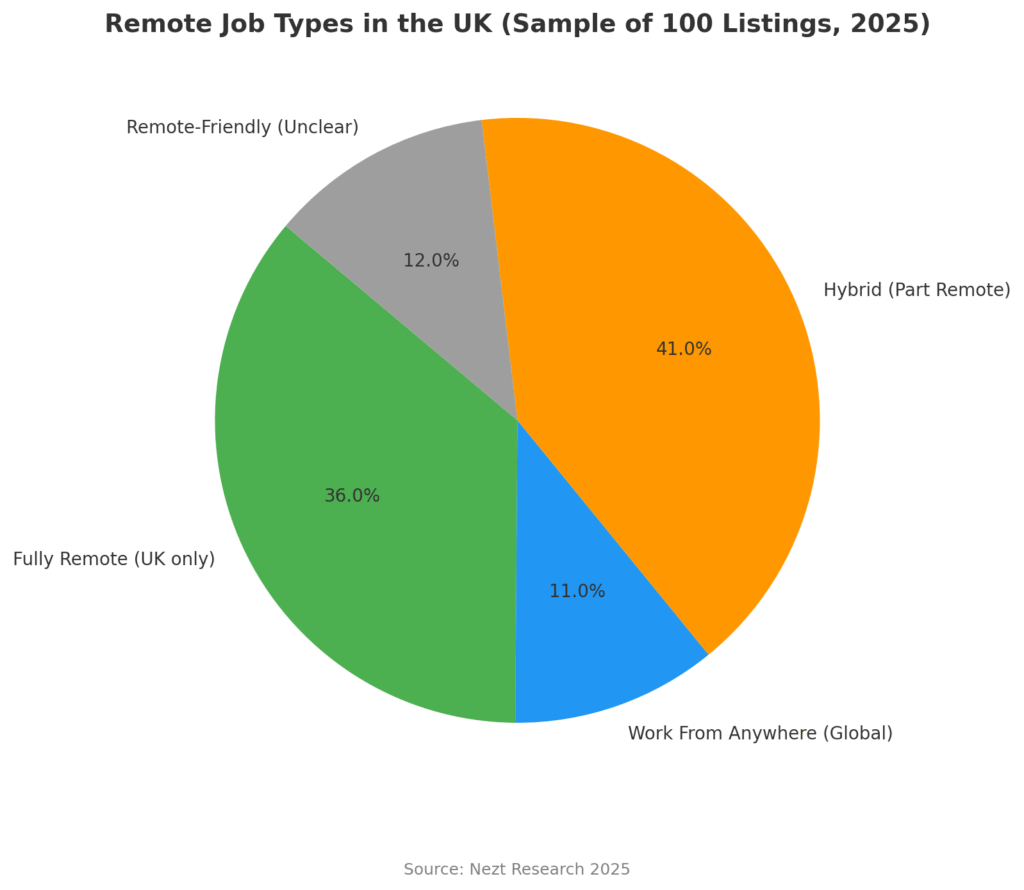In 2025, the concept of “work from anywhere” has evolved from a temporary pandemic response into a permanent shift in the global workplace. With companies increasingly embracing hybrid and remote structures, job seekers are now prioritizing flexibility and autonomy as much as salary and stability. But despite the hype and headlines, how common are fully remote, location-independent roles in the UK job market today? And what do those listings actually promise?
To answer that, we reviewed 100 job postings across platforms like LinkedIn, Indeed, and Glassdoor, spanning multiple sectors including tech, finance, legal, marketing, healthcare, and education. We analyzed job descriptions, employer profiles, and flexibility terms to get a data-backed picture of the current landscape of location-independent employment.
In this article, we’ll break down our findings, explore the trends driving the shift, and explain why “work from anywhere” doesn’t always mean what it implies. Whether you’re an employer looking to attract top talent or a professional considering your next move, this guide provides a detailed look into the UK’s new work reality.
Remote Work in the UK: The 2025 Snapshot
The appetite for remote jobs hasn’t waned — but the definition of remote has become more nuanced. According to Hiring Lab, 14.6% of job postings in early 2025 mention remote or hybrid work options. That’s a notable increase from just 3% pre-pandemic. However, fully remote roles — where an employee can perform their job without ever stepping into an office — have slightly declined from their peak in 2024, currently hovering at 13.2%.
Still, the demand is strong. On LinkedIn, searches for “remote” and “work from home” roles have increased by 22% year-over-year. Google Trends data shows a consistent search interest in “jobs you can do from anywhere UK,” with seasonal spikes in January and September as job-seekers reset their goals.

Our Research: What We Found in 100 Job Listings
We filtered through 100 recent job listings marked “remote,” “flexible,” or “hybrid” across five major platforms: LinkedIn, Indeed, TotalJobs, Reed, and Glassdoor. Here’s how they broke down:
- True “work from anywhere” roles (no location requirement): 11%
- Fully remote (UK-only): 36%
- Hybrid (some in-office required): 41%
- Remote-friendly but vague (requires clarification): 12%
This shows that while the number of UK companies offering some degree of remote work is rising, only 1 in 10 jobs allows full global location flexibility. In other words, “remote” still often comes with strings attached — like proximity to an office, UK-only eligibility, or attendance at quarterly in-person meetings.

Sector-by-Sector Breakdown
Technology & Software Development continues to lead in location independence. Among tech jobs reviewed, 48% were fully remote and 22% were “work from anywhere” globally. UK startups, in particular, have embraced distributed teams.
Marketing & Creative Roles offered moderate flexibility. 35% were remote, while 8% were global. However, many emphasized being “UK-based” for legal or tax reasons.
Finance & Legal sectors showed the lowest “work from anywhere” numbers. Just 3% of listings allowed global flexibility, often due to compliance or regulatory constraints. Still, hybrid work remains strong, with over 60% offering at least part-time remote options.
Healthcare, Education & Public Services mostly required location-based attendance. However, back-office, HR, or support functions were more likely to include remote options.
Why “Remote” ≠ “Anywhere”
One key takeaway is that remote doesn’t always mean unrestricted. Many UK employers use “remote” to mean:
- Work from home within the UK only
- Remote, but within a certain travel radius for monthly office visits
- Temporarily remote with future return-to-office expectations
This lack of standardization causes confusion for applicants. It also limits truly global talent acquisition, especially in high-skill fields like AI, web development, or UX design.
What “Work From Anywhere” Actually Looks Like
The best examples of true WFA (work from anywhere) roles include:
- GitLab – A famously all-remote company, GitLab operates without any physical HQ and employs people across 60+ countries.
- Hotjar – Allows employees to work anywhere in the EMEA region.
- Remote.com – Their core mission supports global employment; naturally, their roles are fully location-independent.
- Doist – A productivity app company with a 100% remote team across 30+ countries.
These companies set clear expectations around async communication, timezone overlaps, and self-management. But they’re still the exception in the broader UK employment landscape.
What UK Candidates Want (And Why Companies Should Listen)
According to a YouGov poll, 73% of UK workers said they would choose a remote-friendly job over a higher-paying in-office one. More than half said they would move cities (or countries) if given the option to keep their job remotely.
Remote work is no longer a perk — it’s an expectation. Offering genuine location independence improves:
- Talent acquisition across regions
- Employee retention
- Cost savings on office space
- Sustainability (fewer commutes = lower emissions)
How Flexible Housing Supports Remote Careers
This employment shift pairs naturally with flexible living models like those offered by Nezt. If workers can relocate freely, they need housing that’s:
- Short-term or monthly
- Fully furnished
- Centrally located
- Tech-enabled with fast Wi-Fi
Nezt provides ready-to-live-in apartments for digital nomads, contractors, and professionals in transition. With this housing-as-a-service model, people can follow career opportunities anywhere — without the burden of long leases or furniture purchases.
Predictions for the Future of Remote Work in the UK
By 2030, it’s expected that 30–35% of all UK knowledge workers will work remotely full-time. AI and digital collaboration tools will make location even less relevant. Meanwhile, the need for flexible housing, digital infrastructure, and portable benefits will only increase.
Companies will need to:
- Develop globally compliant hiring practices
- Redefine employee perks for remote-first culture
- Invest in remote onboarding and team cohesion tools
Job boards, too, will evolve to filter by “true” work-from-anywhere policies, giving candidates better transparency and mobility.
Conclusion
The UK job market is clearly evolving — but true “work from anywhere” roles are still the exception, not the rule. Our review of 100 UK job listings reveals that while remote and hybrid work are increasingly common, only about 1 in 10 positions offer full geographic freedom.
For professionals craving flexibility, it’s essential to read between the lines. And for companies competing for top-tier talent, offering authentic remote options — along with clear communication and flexible housing support — will be the key to hiring success in 2025 and beyond.
If your job allows you to work from anywhere, your life should too. Explore flexible, furnished, commitment-free living at Nezt.co.uk.



